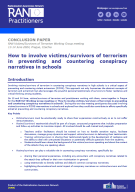Details
- Publication date
- 1 August 2024
- Author
- Directorate-General for Migration and Home Affairs
- Country
- Czechia
- RAN Publications Topic
- Victims of terrorism
Description
Involving victims/survivors of terrorism in countering conspiracy narratives in high schools is a critical aspect of preventing and countering violent extremism (P/CVE). This approach not only humanises the abstract concepts of terrorism and extremism but also leverages the powerful personal testimonials of survivors to foster resilience and critical thinking among students.
On 13 and 14 June, victims/survivors of terrorism and practitioners working with them, came together in Prague for the RAN VoT Working Group meeting on ‘How to involve victims/survivors of terrorism in preventing and countering conspiracy narratives in schools’. During this two-day meeting participants discussed involving victims/survivors in P/CVE interventions in schools and explored how they could also contribute to efforts specifically aimed at preventing and countering conspiracy narratives.
Key Points
- Victims/survivors must be emotionally ready to share their experiences constructively so as to not suffer retraumatisation.
- Victims'/survivors' testimonials should be part of a larger, structured programme that includes preparation and follow-up activities to maximise impact. All involved should be well-trained and prepared:
- Teachers and/or facilitators should be trained on how to handle sensitive topics, facilitate discussions, manage group dynamics and support victims/survivors in delivering their testimonials.
- Training victims/survivors in sharing their testimonials leads to the development of resilience and the ability to deal with unexpected situations or potentially difficult questions from the students.
- Students should learn about the background of the victims/survivors speaking and about the context of the attacks they are speaking about.
- Victims/survivors can play a valuable role in countering conspiracy narratives, specifically by:
- sharing their personal experiences, including any encounters with conspiracy narratives related to the attack they suffered or their own victimisation in general;
- using testimonials to directly address and debunk common conspiracy narratives;
- highlighting the emotional and social impact of conspiracy narratives on victims/survivors and their communities.
This paper will first focus on the general prerequisites for the involvement of victims/survivors of terrorism in P/CVE approaches aimed at youth in an educational setting. Then, a short introduction on conspiracy narratives and what approaches can be used to prevent and counter them will be presented. Lastly, recommendations, challenges and gaps will be shared on how to involve victims/survivors in countering and preventing conspiracy narratives in schools.

